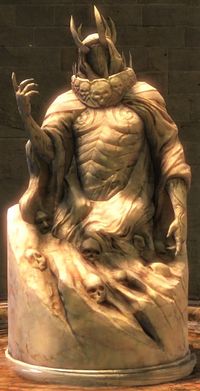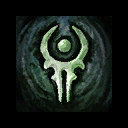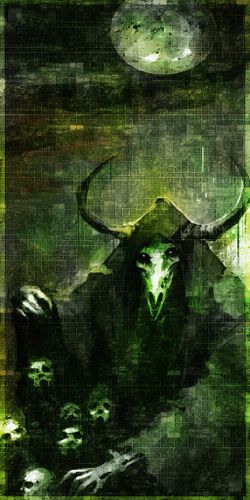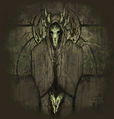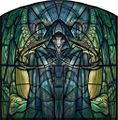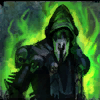Grenth
“Grenth, Prince of Ice, God of Death. He embodies inevitability, the idea that all things have a time... and that time must inevitably pass.
Grenth is the god of darkness, ice, and death.[1] Originally a half-god, he was the child of Dwayna and a mortal sculptor and the first god born of Tyria, with domain over mortality and judgment. As a god, he is attributed to the judgment of the dead, vengeance, and destruction. Grenth promotes the casting off of illusions and "the gilded trappings of sanctity," and encourages the perception of the world as it truly is.[2] This fits with his role as judge to dead souls, and perhaps opposes him to Lyssa, goddess of illusions. He also promotes not fearing those claimed to be divine, and his followers seek to cast down false deities.
Grenth's body appears to be that of a human, and he bears the skull of a fallen beast. He is often depicted with the dead crawling for his acceptance. Being a deathly figure, he is venerated by many human necromancers. Before the Cataclysm, Orrians prayed to Grenth at the Cathedral of Silence. In the present day the Church of Grenth worships the God of Death. The norn refer to Grenth as a Spirit of Action.[3]
Biography[edit]
Early years[edit]
Grenth was born as the half-god son of a mortal sculptor and Dwayna, leader of the Six Gods. Knowledge about him having been fathered by a mortal would eventually become one of the greatest secrets of the Church of Grenth.[4] Little else is known about Grenth's early years on Tyria except for the one moment of defiance that changed his life forever.
Lord of Death[edit]
Grenth and seven mortals challenged Dhuum, the God of Death, whose reign in the Underworld had been brutal as Dhuum consumed the souls of the dead, prevented resurrection and undeath, and hunted down those who had escaped death with the promise of "death undeniable". The company ultimately defeated Dhuum in the ossuary of the Cathedral of Eternal Radiance in Orr. Grenth shattered Dhuum's tower in the Underworld, creating the Chaos Planes.[5]
Dhuum's power was transferred to Grenth, and the new God of Death took his place among the gods in the presence of his mother Dwayna in the spot where his father had fallen. Grenth sealed his fallen predecessor within the Hall of Judgment behind enchanted doors and layers of divine magic as he was not powerful enough to destroy Dhuum. The true reason for the sealing would remain elusive to scholars, however.[6][7] The mortals who aided Grenth were rewarded by being elevated into the god's immortal avatars. They became known as the Seven Reapers and would supervise regions of the Underworld.[8] Under Grenth, human spirits were judged and moved on through the Underworld to their designated afterlives. At some point Grenth also appointed the Judge to guide and judge lost spirits in the Domain of the Lost.
As the new God of Death, Grenth eventually gained more followers. According to the Scriptures of Grenth written in 48 BE, he came to Desmina, a woman who had been scorned and exiled by her people for admiring power and ambition, and offered her control over the undead in exchange for her loyalty. Desmina accepted the offer and became Grenth's First Follower, swearing allegiance in life and beyond. The Church of Grenth gradually rose to prominence and served at the Cathedral of Silence, the first temple dedicated to Grenth in Tyria, and missionaries such as Mausollus traveled abroad to spread the god's teachings. In the Echovald Forest of Cantha, House Durheim of the Kurzicks were a family of historians, scholars and poets who became primarily devoted to Grenth. According to the Durheim, Grenth had rewarded them with the magical ability to chronicle the life of every Kurzick ever born.[9]
When Grenth's powers were raw and new, he created a warhorn named Verdarach which turned more potent—and more sinister—than he ever intended. It called upon the spirits of those who had died in horrific battles and summoned them as vengeful wraiths. After combat, the warhorn's grisly attendants grasped for the souls of the newly slain to conscript them into their ranks.[10]
At some point, Grenth was challenged to a duel by two brothers. It is said that the God of Death was so angered by these two mortals, that instead of simply granting them the sweet peace of death, he turned them into twin serpents and forced them to serve him in the Rift for the rest of eternity. The Twin Serpent Mountains of the Underworld stood as a reminder to all those who served Grenth to be careful that they would not incur such a punishment.[11]
Life in Orr[edit]
“Follower: Where is the god to whom I may give my undying devotion? Where is the god to whom I may beg revenge against those who scorn me?
Avatar of Grenth: Follow where I lead, come whence I call, and the corpses of the dead will be yours to control.
As Orrians worked on building the great city of Arah for the gods, Abaddon, the God of Knowledge, designed a set of magically warded reliquaries where the gods could keep their priceless and powerful artifacts, relics and knowledge safe from thieves and defilers. Grenth was given one of these reliquaries.[12] During this time the gods gathered various powerful and ancient artifacts from around the world, including the original Bloodstone and the Mystic Telescope, and brought them for safekeeping and study in Arah.[13] Like other members of the Six, Grenth had a dirge dedicated to him which was sung by the Sirens of Orr.[14]
At some point the gods became aware of the existence of the hibernating Elder Dragons, who were tied to the magical balance of Tyria, and learned their names and spheres of influence. This information was documented in what would come to be known as the Scroll of the Five True Gods.[15]
According to the Orrian History Scrolls, the gods lived for a time among their followers in Arah. However, their radiance blinded mortals who gazed upon them for too long whenever the gods appeared among their followers. The gods eventually decided to retreat from public, and Dwayna commissioned the Orrian sculptor Malchor to make a statue of each god. As the statues were completed, the respective gods depicted in the statues retreated into Arah one by one. However, it is not known if Malchor's work on the statues preceded the birth of Grenth due to the statue of Grenth having text attributed to Desmina unlike other statues which have text attributed to Malchor himself.[16]
Exodus of the Gods[edit]
According to an ancient Ascalonian legend and an Orrian scroll, the gods formulated a magical ritual and gifted three holy artifacts needed to enact and reverse it—a magical crown, Balthazar's own sword Sohothin and its twin Magdaer—to the royal human lineage as protection against invasion. The artifacts, as well as the knowledge how to use them in the ritual, would eventually pass on to the Ascalonian line of human kings.[17][18]
In 1 BE, the Six decided to gift magic to the mortal races. The gift of magic made the mortal races greedy, however, and led to devastating wars. King Doric, who had become the ruler of Tyria's united human tribes, journeyed to Arah and asked for the Six to put an end to the bloodshed. In response to the king's plea, the gods shattered the original Bloodstone and divided the magic in the world into five lesser Bloodstones to prevent anyone from ever wielding power over all magic again. According to some historical documents, the gods sealed the stones with Doric's blood and placed his bloodline in charge of guarding the stones.[19][20]
Abaddon turned against his fellow gods because of a disagreement over the gifting of magic among many other escalating events that followed the sealing of the Bloodstones. The rebellious god and his army of Margonites were defeated after their failed assault; however, the gods' victory came at the cost of the Crystal Sea turning into the Crystal Desert and a once plentiful land becoming the sulfurous Desolation. Balthazar, the God of War himself, forged the chains that bound the fallen god in the Realm of Torment.
The Five realized the damage which the war against Abaddon and the gifting of magic from earlier had caused to the world and decided to leave humanity to stand or fall on its own merits without further meddling.[21] They departed from Tyria in 0 AE in an event known as the Exodus of the Gods. The Five entered the Mists and continued governing their respective realms from there although they did not sever their ties with Tyria completely as their power was still felt in the world for centuries to come.
At some point, Wintersday traditions, centered on the rivalries of the gods and the changing of the seasons which would symbolically determine whether darkness or light would reign following the coming of the new year, emerged among humanity. Avatars of the gods appeared on Tyria and asked participants to choose which of the two teams to side with for the festive, annual competition which would decide whether Dwayna or Grenth won. Dwayna, who was supported by Melandru, fought to return spring to the land and bring joy to the hearts of humanity via renewed life, while Grenth, who was supported by Balthazar, fought to prolong winter and offered a less frivolous outlook on life and somber reflection on death as part of the circle of life.[22] These festivities also included the Great Snowball Fight of the Gods.
Around this time, Dwayna's magic created the first Brrrls, or Snowmen, to spread Wintersday cheer and hand out gifts from the Secret Lair of the Snowmen, while Grenth's magic caused unfortunate victims to transform into the mischievous Grentches who would spread misery in their wake as well as steal and hide gifts of innocent children in remote locations such as the Underworld.[23][24] Grenth was infuriated by being defeated in a previous year's Wintersday, so his servants worked to lift the god's spirits by sending adventurers to the Isle of Istan to destroy a great snowman, which the Istani children had been making to surpass the renowned Tyrian snowman Freezie, so the children would learn that Wintersday was a grim season of reflection and self-loathing.[25]
Conflicts in the Mists[edit]
In the late eleventh century AE, Dhuum's minions waged a war in the Underworld against Grenth's forces and aided the servants of Abaddon in trying to bring about Nightfall. This culminated when Dhuum woke from his slumber, though the Seven Reapers were able to place him back into dormancy with the aid of mortal adventurers.
When Abaddon began Nightfall in order to break free from his prison, the gods chose not to intervene on Tyria directly. However, the Five gave a blessing and words of encouragement to Spearmarshal Kormir's party via their avatars as the mortal heroes entered the Realm of Torment to defeat Abaddon once and for all.
|
After Kormir had successfully absorbed the vanquished Abaddon's rampant magic and ascended to godhood at the end of Nightfall in 1075 AE, the temporary spike in magic was enough to stir Primordus and begin the next cycle of Elder Dragon awakenings. Most of the gods advocated for severing ties with Tyria for good and leaving its inhabitants to face the calamity on their own as the gods' interference would only make matters worse. Balthazar vehemently disagreed with his fellow gods, however. Having been more or less idle since the Exodus, the God of War craved for action and was more than willing to accept the challenge of facing the Elder Dragons in combat in order to add their power into his own.[26] Disagreements led to arguments, and the angered Balthazar accused the other gods for being cowards and threatened to strike them down as well. Understanding that the God of War had to be stopped or his ambitions could lead to Tyria's destruction, the other gods joined forces and stripped Balthazar of his power, imprisoning him in the Mists where they intended to leave him in chains so he could never threaten anyone again. Balthazar felt betrayed and vowed to have his revenge on his fellow gods and make them scream their allegiance before he would end their lives and claim their power as his own.[27] The rest of the gods decided to continue with their original plan, leaving Balthazar behind. The God of War remained imprisoned until 1328 AE when Rytlock Brimstone happened upon his location while searching for the missing sword Sohothin. Balthazar reignited the sword, and the grateful Rytlock severed the fallen god's chains without realizing who the mysterious prisoner actually was and left the Mists through a portal which opened nearby. By the time Kormir realized that Balthazar had returned to Tyria and used Lyssa's enchanted mirror to masquerade as the mursaat Lazarus, the other gods had already departed.[27] Meanwhile, Dhuum had successfully broken free from his bindings and used Grenth's absence to his advantage to corrupt the Underworld. He used Statues of Grenth to create a ward which kept the Reapers from reaching him, redirected the River of Souls to the Hall of Judgment to empower himself with souls, and either destroyed or corrupted Grenth's minions as his influence spread throughout Hall of Chains. Desmina was one of the denizens of the Underworld who viewed Grenth's departure as fleeing, but she and the Reapers ultimately succeeded in breaking into the Hall of Judgment and resealed Dhuum within a stronger prison than before with the help of mortal raiders.[28] The victory cost the lives of the Reapers, however, leaving Desmina in charge of the Underworld in Grenth's absence. In Cantha's Echovald Forest, the Valdhertz Crypts held an artifact from House Durheim known as the Heart of Grenth. Its power did not protect the hiding Kurzicks and dredge from the Ministry of Purity's purges as expected, however; the artifact had instead prevented the fallen affected within its radius from moving on to their designated afterlife and forcing their ghosts to haunt the crypts centuries after their demise and twisting them to think they were reliving their final, painful moments in life and viewing mortal trespassers as their killers.[29][30][31] While exploring the crypts in 1335 AE, adventurers fought against the confused ghosts one group at a time, eventually bringing the ghosts back to their senses and learning from then how the Heart was affecting them and that it had been corrupted by a mysterious power later identified as the Void. Upon cleansing the Heart of Grenth from Void corruption by damaging it, the adventurers also learned that the artifact would only remain inactive for a time until it had soaked up more of the spreading Void corruption to begin affecting the ghosts of Valdherz Crypts all over again. The ghosts urged the adventurers to end the corruption at its source to release them from their centuries-long torment.[32] During the same year, exploration of the ruins of Old Kaineng revealed celestial plaques that told the supposed origin stories of Cantha's revered Celestials. Although most of these texts corresponded with other plaques found in Cantha centuries ago, the plaque about the Celestial Phoenix's origin and Grenth's role in it differed in its telling significantly and offered a more ruthless view of the God of Death: instead of granting Hai Jii justice by punishing the killers of his family as an earlier telling of the story had suggested, this newly discovered plaque stated that Grenth had chosen to punish the murdered family members instead and had forced Hai Jii to undergo a painful transformation into the Celestial Phoenix. |
Scriptures[edit]
“Came then Desmina, scorned and exiled by her people. And in her misery and wretchedness, did Desmina curse the gods for abandoning all who, like her, admired power and ambition.
And asketh she, "Where is the god to whom I may give my undying devotion? Where is the god to whom I may beg revenge against those who scorn me?"
And rumbled then the earth from far below, and with a terrible groan, split open. The ground grew white with frost and ice, and from forth the frozen earth spilled the rotted, skeletal minions of Grenth.
Appeared then the god, and with bony hands outstretched, welcomed the girl into His fold. Saith he, "I am your god. Follow where I lead, come whence I call, and the rotted corpses of the dead will be yours to control." And swearing allegiance in life and beyond, did Desmina thence become the god's first follower.
— Scriptures of Grenth, 48 BE
“The Phoenix, the representation of fiery eternity in the Underworld.
Hai Jii was the youngest of eight sons from a noble family long known for producing talented Warriors. He did not like to fight, preferring to wield his paintbrush with which he had unsurpassed skill. One evening, his family was attacked by a neighboring warlord. Hai Jii was tortured and left for dead, but as the invaders swept down upon his two baby sisters, he arose, took up the sword he had so despised, and single-handedly killed every invader. When his grim task was complete, Hai Jii dropped to his knees and begged Grenth to see to it that his family's murderers found no peace in the afterlife. Grenth heard Hai Jii's prayers, dooming the souls of the murderers to an eternity of fiery torture.
“Grenth, son of Dwayna, first god born of Tyria. His powers deal in mortality and judgment. Defeater of Dhuum, Lord of the Seven Reapers, he is the prince of ice and sorrow.
Standing before his immortal mother, Grenth claimed his place among the gods. Where his father had fallen, Grenth would rise.
— Orrian History Scrolls, The Six, Volume 6—Grenth: God of Death.
“To Grenth's ears, there came a cry from the soul of one who had suffered long and profoundly. The god was drawn to the woman who called, for she had no mercy left in her.
Seeking vengeance for her husband's violence against her, she evoked Grenth's judgment upon the husband even as she plunged the knife into his heart.
As Grenth stood over her and the husband she had murdered, he saw that she had loved him once, that she had borne him children, and that she had been a good and loyal wife.
He saw that the man had never loved her, but had resented her and their children for draining his pockets. He saw that the man had not been loyal, and had never been kind.
He saw the abuses he had rained down upon his wife. And so, the god of death said, "I find you guilty, woman, of murdering your husband. When it is your time, you will pay for what you have done."
"I understand," said the woman as she bowed before Grenth.
"And now," said Grenth, "I give you a choice. You may come with me now and watch your husband suffer for the wrongs he has done. Or you may walk away, and I will claim you only when it is your time."
The woman said, "I gave my husband my love and life. I will come now, to see this tale's end and to share his suffering. It will hurt him more to know that I am witnessing his pain." And so it was.
“Constellation "The Falling Flame"
Hai Jii stood before the dais where Grenth sat, and he begged, "Please, this isn't their fault. I'm the one that killed the invaders—my hands are dipped in their blood."
The God of Death pondered the boy's pleas; but instead of showing any benevolence, he sentenced Hai Jii's family to an eternity of torture by flame. The boy crumpled to the floor and wept tears of magma. His cheeks burned away with every drop.
When he awoke, his body was made of stars—his arms powerful, fiery wings. A new phoenix had risen from the ashes of the Underworld, and he took his throne beside the other Celestials. There, he would weep an eternity of flame.
Gallery[edit]
- Concept art
Ancient Ascalonian mural of Grenth.
Concept art of Grenth's avatar by Kekai Kotaki.
Concept art by Hyojin Ahn.
- Miscellaneous
Guild emblem depicting Grenth.
Related achievements[edit]
 Howler III: Howl: Underworld Essence — Commune with the Grenth's Door place of power in Lornar's Pass.
Howler III: Howl: Underworld Essence — Commune with the Grenth's Door place of power in Lornar's Pass. Meteorlogicus III: Storm: Underworld Dominance — Help Keeper Jonez Deadrun regain control of the Temple of Grenth in Cursed Shore.
Meteorlogicus III: Storm: Underworld Dominance — Help Keeper Jonez Deadrun regain control of the Temple of Grenth in Cursed Shore. The Dreamer III: The Lover: Dream of Grenth — Found in the chest after cleansing the Cathedral of Silence in Cursed Shore.
The Dreamer III: The Lover: Dream of Grenth — Found in the chest after cleansing the Cathedral of Silence in Cursed Shore. The Juggernaut I: The Experimental Hammer: Ponder the Cleansed Grenth Temple — Ponder the Cathedral of Silence after cleansing it of Orrian coruption.
The Juggernaut I: The Experimental Hammer: Ponder the Cleansed Grenth Temple — Ponder the Cathedral of Silence after cleansing it of Orrian coruption. The Moot III: The Energizer: Dance for Grenth — Dance for Grenth at the Altar of Grenth, in his Temple in Orr.
The Moot III: The Energizer: Dance for Grenth — Dance for Grenth at the Altar of Grenth, in his Temple in Orr. Twilight III: Dusk: Grenth's Darkness — Use the Gloominator to capture the darkness at a portal to Grenth's domain in the battle for the Cathedral of Silence in Cursed Shore.
Twilight III: Dusk: Grenth's Darkness — Use the Gloominator to capture the darkness at a portal to Grenth's domain in the battle for the Cathedral of Silence in Cursed Shore. One Path Ends: Storyteller: Grenth — Find all the pages of the Parable of Grenth. (3)
One Path Ends: Storyteller: Grenth — Find all the pages of the Parable of Grenth. (3) The Desolation: Path of the Gods — Kneel at the statues of each human god. (7
The Desolation: Path of the Gods — Kneel at the statues of each human god. (7 )
) Cantha: The Six — Find ancient statuettes of The Six that have been scattered around Cantha. (6
Cantha: The Six — Find ancient statuettes of The Six that have been scattered around Cantha. (6
 )
)
Trivia[edit]
- Grenth has inspired the naming of many locations throughout Tyria, among the most notable being the Plaza of Grenth in Divinity's Reach.
- It is speculated by many that Malchor the Sculptor is the father to Grenth. Grenth was born a half-god, his mother being Dwayna and father was a mortal sculptor; this is one of the greatest secrets of the Church of Grenth.[4] Additionally, it was said that Grenth rose where his father fell—both Dhuum's Last Stand (where the mantle of the godhood was transferred onto Grenth) and Sculptor's End are located within Malchor's Leap. More tellingly, the written words on the Statue of Grenth were changed during Living World Season 1; the text was originally attributed to Malchor but was changed to Desmina, suggesting that Malchor might not have ever set eyes on Grenth when sculpting the statues of the gods.
- Grenth's name is uttered by humans in common sayings such as "Great Grenth's garters",[33] "Grenth's guts",[34] "Grenth's icy toes",[35] "Grenth's scythe",[36] "Grenth's teeth",[37] "Feel Grenth's icy touch",[38] "Grenth take [one]",[39] "Grenth torment [one]",[40] "Like a bat out of Grenth's hall",[41] "May Grenth spit in [one's] eye",[42] "May Grenth have mercy on [one's soul]",[43] "May Grenth shield [one]",[44] "To Grenth with [something/someone]",[45] "Prepare to meet Grenth",[46] and "Remember me to Grenth."[47] Krytan priests invoke Grenth to ward the contents of brew shipments from fermentation.[48]
- Grenth is also referred to as:
See also[edit]
| The Guild Wars Wiki has an article on Grenth. |
- Blessing of Grenth
- Dirge of Grenth
- Reaper of Grenth
- Grenth's Eye
- Parables of the Gods
- Statue of Grenth
- The Heart of Grenth
- The Six
- Associated items
- Seven Reapers weapon skins
- Ancient Statuette of Grenth
- Grenth Hood Skin
- Grenth Statue
- Grenth's Regalia Outfit
- Grenth's Vow
- Relic of Grenth
- Shadow of Grenth
- Signet of Grenth
- Superior Rune of Grenth
- Tear of Grenth
- Twilight
- Verdarach
- Visage of Grenth
References[edit]
- ^ Biography: Human
- ^ The Necromancer's Path
- Zratha Kor: Tell me, have you ever felt the call of Grenth within your heart? The ignorant view necromancy and our cold god as tainted by evil. It is nothing of the sort. Grenth invites you to cast aside all the illusions of this world and judge things truly as they are. It is not too late for you to take this path, <Character name>. Go into the Prophet's Path and slay the Sacred Griffon of Amnoon, a creature once worshiped by the people of the desert. This will show me that you are not deceived by the gilded trappings of false sanctity that beguile so many.
- ^ GuildMag Issue 5: Frigid Times, Issuu.com:
- Jeff Grubb: The whole question of gods is based upon culture. The humans have tangible, powerful beings that they can interact with—hence, gods. The spirits of the norn also fit that description, so humans would call these beings "gods" as well. Norn would disagree. And describe the human gods as being "Spirits of Action" of the humans—Balthazar is obviously War, and should be spoken of as such. Kormir is Knowledge and calling her Kormir is a quaint human thing.
- ^ a b Cathedral of Silence
- Priestess Rhie: Grenth is Dwayna's son, but only half-god. His father was a mortal sculptor, but that is one of the greatest secrets of our church.
- ^ The Four Horsemen
- Reaper of the Chaos Planes: Before the time of Grenth, when death was ruled by a cruel and unjust god, there stood a tower and a throne on this very plain. But Grenth rose up and destroyed the one called Dhuum and shattered down his tower, leaving only these storms of chaos as a reminder of the power once held dominion here.
- ^ Something Wicked This Way Comes
- King Frozenwind: Long have the bards sung of Grenth's defeat of Dhuum, the former ruler of the Underworld. With the help of the rebellious Reapers, Grenth usurped Dhuum's throne. But the books and songs only tell part of the tale. You see, Dhuum was not fully destroyed; Grenth was simply not powerful enough to slay him. Instead, he forced Dhuum into a state of dormancy and imprisoned him within the Hall of Judgment, trapped behind massive enchanted doors and layers of divine magic. There Dhuum remained, slumbering...waiting. But his torpor is not so heavy that Dhuum does not occasionally wake.
- <Character name>: Why does he continue to wake? Is a little sleepwalking really that harmful?
- King Frozenwind: Dhuum awakens fueled by dark powers, eager to reclaim his seat as The Final Judge, and set to cull the life from those who cheat death. Every time a creature in the Underworld dies, the release of life energy adds to Dhuum's vigor. Too many beings are being slain in the Underworld. Dhuum grows both strong and restless. I fear that one day he will come to his full strength, and then those doors will not hold. Where Dhuum walks, candy man, no soul is safe! Go, tell your master to heed my warning: Dhuum remains the most serious of threats!
- ^ Hall of Chains
- Scholar Glenna: Maybe Grenth planned on judging Dhuum for his misdeeds. Or maybe Death just can't be made dead.
- ^ Cathedral of Silence
- Priestess Rhie: The Seven Reapers were mortal heroes who fought beside Grenth when he defeated Dhuum. He rewarded them by elevating them to become his immortal avatars.
- <Character name>: Anything else about them?
- Priestess Rhie: They govern the various regions of the Underworld—the Labyrinth, Bone Pits, Chaos Planes, and so forth.
- ^ An Empire Divided: A Selected History of Mysterious Cantha for the Traveling Scholar
- ^ Official Long Live the Lich release page, GuildWars2.com
- ^ Reaper of the Twin Serpent Mountains
- ^ A Parable of Abaddon
- ^ The Ruined City of Arah (explorable) Jotun path
- Varra Skylark: There are ancient jotun legends of a sky-sweeper, a great magical observatory. I believe that the human gods brought that magic telescope here and rebuilt it. [...]
- Varra Skylark: My study of those stones in the Shiverpeaks leads me to believe [the jotun] knew when the dragons would awaken.
- Varra Skylark: That knowledge was found by the human gods and brought here to Arah.
- ^ Siren Master
- ^ Hidden Arcana
- Ogden Stonehealer: Much of what we know about them comes from a document written by the first humans to walk the face of Tyria: the Scroll of the Five True Gods. [...]
- Ogden Stonehealer: In it, the gods revealed the names of the Elder Dragons: Mordremoth, Kralkatorrik, Jormag, Zhaitan, and Primordus. [...]
- Ogden Stonehealer: The gods expound on how Tyria's health is tied directly to them. This portion is somewhat abstract, however.
- ^ It is not known if Malchor ever sculpted a statue of Grenth, or if his work preceded the birth of Grenth as the statue of Grenth has text attributed to Desmina when all other gods' statues have text attributed to Malchor. See trivia section's speculation on Malchor being Grenth's father for more details.
- ^ Comment by Connie Griffith, Reddit.com
- ^ Plan of Attack
- Rytlock Brimstone: I've researched the ritual, and I learned a lot about Ascalonian history. This story began a thousand years ago, when this ritual was first formulated by the humans' gods—the Six.
- <Character name>: Please, go on.
- Rytlock Brimstone: The Six gave them magic. At the same time, they also gave one of them a magical crown and two magical swords to protect the kingdom.
- <Character name>: Sohothin and Magdaer. And King Adelbern had inherited the crown?
- Rytlock Brimstone: Exactly. The crown was designed to break into four parts. When the fragments are separated, they're hard to see. This was a safeguard to keep this powerful item from falling into the wrong hands.
- <Character name>: And the crown is required for the ritual?
- Rytlock Brimstone: It is. When Adelbern enacted the ritual with Magdaer, he became a ghost. But the crown was preserved and found by charr who entered the area later. They toyed with it, and the fragments were lost. [...]
- Rytlock Brimstone: It all hinges on Sohothin, my sword. There were originally two of them—Sohothin and another called Magdaer. They were given to the Ascalonians as protection against invasion. [...]
- Rytlock Brimstone: Irrelevant. Point is that its partner, Magdaer, is the sword Adelbern used to curse the Ascalonians. I've long suspected that Sohothin is the blade that can break the curse.
- <Character name>: Okay. So, how?
- Rytlock Brimstone: I've had my snout buried in scrolls and books at the Priory. One of the scholars there has been helping me tack together the history. I finally found a reference to the ritual.
- <Character name>: And you trust the source?
- Rytlock Brimstone: It's got an Orrian stamp on it, which makes it so old, it's got to be legitimate. In any case, I have to try. If it works, we'll be free.
- ^ Bloodstones
- ^ History of Tyria
- ^ Dolyak Express Jan 10, 2014, Old Guild Wars 2 Forums (Archived)
- Jeff Grubb: The human gods still exist, and their power is still felt within Tyria. However, they have pulled back into the mists, leaving the humans to stand (or fall) on their own merits. There has been a tendency for the human gods to, um, meddle with their worshippers a bit much, and in the wake of the final battle of Abaddon, they have been trying to cut back. Also, the destruction of the big A and his replacement with Kormir in the Pantheon resolved one of their ties with physical contact with Tyria. So there are ties, but you just can’t ring them up to take on the Elder Dragons.
- ^ Wintersday Finale
- ^ a b A Very Grentchie Wintersday
- ^ You're a Mean One, Mr. Grenth
- ^ a b White Mist
- ^ Comments by Connor Fallon and Scott McGough, Reddit.com
- ^ a b Facing the Truth
- Kormir: We, the gods, saw there could be no victory in our inevitable conflict with the Elder Dragons.
- Kormir: Waging war with them could only lead to the destruction of Tyria—and we, the Six, would be the match that would start the blaze.
- Kormir: And so, we chose to withdraw from Tyria altogether, and spare this world further calamity... Or rather, most of us chose to. [...]
- Kormir: Balthazar was blinded by his pride. The dragons are beyond even the gods—a raw, primal force without equal.
- Kormir: Whether he won or lost—by his death or theirs—Balthazar's ambitions would bring about the end of Tyria.
- Kormir: The rest of the Six—Dwayna, Grenth, Melandru, even Lyssa—reached an agreement. Balthazar had to be dealt with. [...]
- Kormir: We stripped him of his power, and chained him in the Mists. There he would remain, forever—powerless to carry out his plans.
- Balthazar: Mark these words: when I'm free, I will strike you down, and claim your power for my own! [...]
- Kormir: When he returned to this world, Balthazar disguised himself as Lazarus with Lyssa's Mirror—the only magic powerful enough to hide the truth from our eyes.
- Kormir: By the time the ruse was revealed, the other gods had already departed. And soon I will join them.
- ^ Hall of Chains
- Desmina: Grenth fled, and we failed to keep the Ender in his chains.
- ^ Clear the crypt's makeshift armory
- ^ Fully explore the Valdhertz living quarters
- ^ Survive the attack in the magic laboratory
- ^ Shut down the Heart of Grenth
- ^ Separatist Sympathizer
- ^ Slim Mikhart
- ^ The Nightmare Ends
- Marjory Delaqua: Grenth's icy toes, why didn't I think of that?
- ^ Seraph Watchman Morina
- ^ Rending the Mantle
- Exemplar Mehid: Grenth's teeth, it's a list of targets!
- ^ Aaron Fletcher
- ^ The Trap
- Corporal Kellach: Grenth take you! I won't...I won't give in.
- ^ Liberation
- Deborah: Grenth torment me—is it really you?
- ^ Defending the Breach
- Olrun Olafdottir: Hail, friend! King Jalis sent a unit of Dwarves to clear the Destroyers out of Raven's Point, but they've run into some trouble. Their engineer, an annoying little Asura named Xapp, flew out of the caverns like a bat out of Grenth's hall, screaming about how Captain Sargen's unit was under siege by Destroyers.
- ^ Breaking the Blade
- Quinn: May Grenth spit in their eye.
- ^ The Fall of Falcon Company
- Captain Tervelan: Falcon Company is long gone. May Grenth have mercy on their souls.
- ^ Whispers Slayer
- ^ A Tangle of Weeds
- Villager: But...ah, to Grenth with the gold.
- ^ In the Ruins
- Stefan Baruch: Prepare to meet Grenth, vermin!
- ^ Sharkmaw Caverns ambient dialogue
- ^ Protect the brew shipment
- ^ a b Priestess Corpse
- ^ a b Orrian History Scrolls
- ^ In Grenth's Defense
